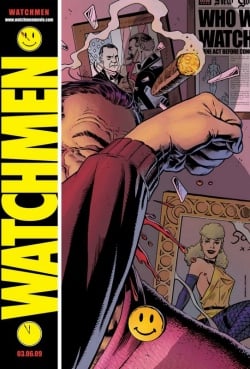Why Watchmen Should Never Have Been Made

Whether you love how faithful Watchmen's adaptation is or you're full of nitpicks, anyone who read the original graphic novel hasn't been able to help comparing the book and the movie. It makes sense-- the book was an iconic addition to the genre, and has spent so long trying to be turned into a movie that multiple generations had fallen in love with the book long before Zack Snyder got his hands on the movie rights.
But did a book so popular, and so rooted in the time it was written, ever really need to be made into a movie? Reading Watchmen is a sublime literary experience, with all the added texts and fractured timelines making you really work to understand the narrative. It was obvious that much of this would have to be cut for the movie, and since Watchmen's core story is a linear narrative about six characters, the basic details stayed in place. But much of what is missing from the movie Watchmen is the soul given by the details, the intricately recreated New York City or the side characters who hang around the newsstand and comment on the doomsday news. Even some of the major characters, the Comedian and Silk Spectre especially, are fuzzier in the movie because of those lost details.
Which, as I said, is to be expected. But the whole point of adapting books into movies, other than making guaranteed millions of dollars, is bringing some new life to the story, making real what the imagination could only dream of before. The Harry Potter movies, while largely inferior to the books, still have that visceral thrill of seeing Hogwarts actually exist. Most of the other comic book adaptations before this one have condensed stories from years of epic serials, taking shoddy paper images and blasting them into glorious 3D.
But Watchmen was already as beautifully drawn as you could ask for, and its carefully chosen panels beautifully cinematic. The characters, so far from the invincible supermen of the early comics, had all their faults and psychological profiles, and the story was deliberately removed from the "catch the bad guy" antics of the archetypal men in capes. For much of this decade comic book movies have broken the mold on what we thought possible from traditional masked heroes, but really, Alan Moore showed us how it was done over 20 years ago.
And Alan Moore chose carefully when he made his story in the mid-80s, transmuting global fears of nuclear wear into a world where superheroes could be the only salvation. In this decade, comic book movies have served a similar purpose as vessels for our worst fears and best dreams, from the post-9/11 healing of Spider-Man to the Bush-era spying in The Dark Knight. But Watchmen is firmly, deliberately entrenched in the era in which it was written, suffused with Cold War paranoia and a genuine belief that humans are pretty likely to blow each other up any minute. Our world is still plenty scary, but doomsday scenarios and nuclear war are only a dim memory now. Period films can be great, of course, but the power of Watchmen the book was that is was a commentary on its time; Watchmen the movie, despite its whiz-bang technology, is a relic.
There's nothing wrong with enjoying Watchmen on the screen, even if it's your first exposure to the material and you never really figure out who Hollis Mason is. But the best hope for the movie is that it serves as an introduction to its rich source material, and everyone who sees the film eventually reads the book and understands the true power of the story. The movie version of Watchmen isn't bad or good; it's just unnecessary.
Your Daily Blend of Entertainment News
Staff Writer at CinemaBlend

